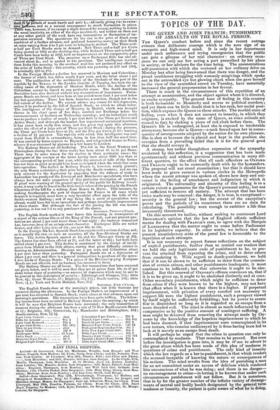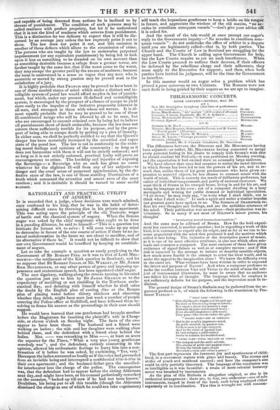TOPICS OF THE DAY.
THE QUEEN AND JOHN FRANCIS: PUNISHMENT OF ASSAULTS ON THE ROYAL PERSON.
THE Queen's conduct before and since the recent outrage evinces that deliberate courage which is the sure sign of an energetic and high-toned mind. It is only in her deportment under such unforeseen and trying emergencies that the public can gain a glimpse of her real character : on ordinary occa- sions we can only see her acting a part prescribed by her place in society, or her advisers for the time being. The unostentatious self-possession with which she ventured on her ordinary drive on Monday last after being forewarned that there was danger, and the proud confidence struggling with womanly misgivings which spoke out in the untroubled eye but glowing cheek when she gave herself to the view of the assembled crowd on Tuesday, have materially increased the general prepossession in her favour.
There is much in the circumstances of this repetition of an
attempt at assassination, and the object against whom it is directed, to excite sympathy. The general tone of feeling in this country is both favourable to Monarchy and averse to political murders ; and yet there can be little doubt that it is her rank, her social posi- tion, which exposes the Queen to these attacks. The morbid state of feeling, even when it does not amount to insanity, in which they originate, is excited by the name of Queen, as some animals are roused to fury by shaking a piece of red cloth before them. The Queen's life is endangered, at least she is exposed to intolerable annoyance, because she is Queen—a rank forced upon her in conse- quence of arrangements adopted by the nation for its own pleisure. She is shot at because she is placed and kept in the position she occupies from a prevailing belief that it is for the general good that she should occupy it.
A strong, but rather thoughtless expression of the sympathy awakened by this reflection, is a suggestion that has been made spontaneously and without previous communication in many dif- ferent quarters, to the effect that all such offenders as OXFORD and FRANCIS ought to be summarily dealt with by the bystanders. The proposal will not stand examination ; but that it should have been made in grave earnest in various circles in the Metropolis where the recent attempt was spoken of, shows how deep and uni- versal is the feeling of attachment and indignation in which it originated. The universality and sincerity of this feeling is to a certain extent a guarantee for the Queen's personal safety, but not yet sufficient to remove all anxiety. The attempt that has been twice made may be renewed: the danger, it is true, is exceptional— security is the general law ; but the extent of the exception's power and the periods of its recurrence there are no data for calculating. The possibility were enough to embitter a life thus incessantly threatened. On this account we incline, without seeking to controvert Lord BaouGuam's opinion that the law of England affords sufficient means for dealing with Faericis's case, to agree with the Marquis of LANSDOWNE that the matter ought to come before Parliament in its legislative capacity. In other words, we believe that the present unsatisfactory state of the penal law is favourable to the repetition of such attempts.
It is not necessary to repeat former reflections on the subject of capital punishments, further than to remind our readers that we hold the only legitimate ends of punishment to be, to pre- vent the criminal from repeating the crime, and to deter others from emulating it. With regard to death-punishment, we hold that if it can be shown to be sufficient to deter from the commis- sion of certain crimes, and other punishments inadequate, it must continue to be inflicted ; but that otherwise it ought to be abo- lished. But this renewal of OXFORD'S offence convinces us, that if it is to be given up, it ought to be abolished distinctly and at once. Other secondary punishments, which might be sufficient to deter from crime if they were known to be the highest, may not have that effect when it is known that there is a higher. If perpetual imprisonment, with privation of every comfort not necessary to support life were the highest punishment, such a prospect viewed by itself might be sufficiently forbidding; but its power to create fear is diminished so long as it is regarded as an escape from a more dreaded evil. The mind is almost as much influenced by the comparative as by the positive amount of contingent suffering. A man might be deterred from renewing the attempt made by Ox- FORD by the knowledge of the hopeless imprisonment to which he had been doomed, if that imprisonment were contemplated in its own terrors, who remains undismayed by it from having been led to look at it merely as an escape from death. It will perhaps be urged that the crime in question can only be contemplated by madmen. That remains to be proved. But even before the investigation is gone into, it may be of use to advert to the great abuse which has been made of this plea of madness in questions of crime and punishment. The only kind of insanity which the law regards as a bar to punishment, is that which renders the accused incapable of knowing the nature or consequences of his actions. The mind revolts from the idea of punishing a man for an act committed under an access of delirium which rendered him unconscious of what he was doing ; and there is no danger— no encouragement to crime—in letting it be known that under such circumstances punishment will not follow. But it is notorious, that in by far the greater number of the infinite variety of derange- ments of mental and bodily health designated by the general term madness or insanity, the patient is quite aware of what he is doing, and capable of being deterred from actions be is inclined to by threats of punishment. The condition of such persons may be called madness with perfect propriety, but let it be understood that it is not the kind of madness which screens from punishment. This is a distinction far too delicate to expect that it will be dis- cerned by an average jury unless the law expressly point it out to them. The law does not point it out, and this omission is another of those defects which allure to the commission of crime. The .persons who are taught by the law to undervalue perpetual imprisonment (or any equivalent punishment) by being led to look upon it less as something to be dreaded on its own account than as something desirable because a refuge from a greater terror, are further taught by the same law, that if the worst come to the worst, they may escape the greater peril by the excuse of madness ; because the term is understood in a sense so vague that any man who is eccentric or moved by strong passion may be proved mad to the satisfaction of a jury.
It is highly probable that FRANCIS may be proved to have been in one of' those morbid states of mind which under a distinct and in- telligible system of penal law would afford no plea in bar of' punish- ment, but which, under our present ill-defined and unintelligible system, is encouraged by the prospect of a chance of escape to yield more easily to the impulse of the imitative propensity inherent in all men, and strongest in those with whom wit wavers. It is al- most equally probable that he may be proved to be one of those ill-conditioned beings who.will be allowed by all to be sane, but who are encouraged to commit criminal acts by being led to believe all punishments short of death endurable, because the law does not esteem them sufficiently terrible for its purpose, and by the pros- pect of being able to escape death by getting up a plea of insanity. In either ease, we shall be perfectly entitled to say that the Queen s danger has been materially increased by the unsettled and vague state of the penal law. The law is not in conformity to the exist- ing moral feelings and opinions of the community : so long as it does not harmonize with them it will not be strictly enforced ; and so long as it is not strictly enforced, practical laxity will prove an encouragement to crime. The hardship and injustice of exposing the Sovereign-- a Sovereign who as such has given no cause whatever for the slightest ill-will from any of her subjects—to danger and the cruel sense of perpetual apprehension, by the de- fective state of the law, is one of those startling illustrations of a truth which command the attention and assent even of the most careless ; and it is desirable it should be turned to some useful account.



























 Previous page
Previous page